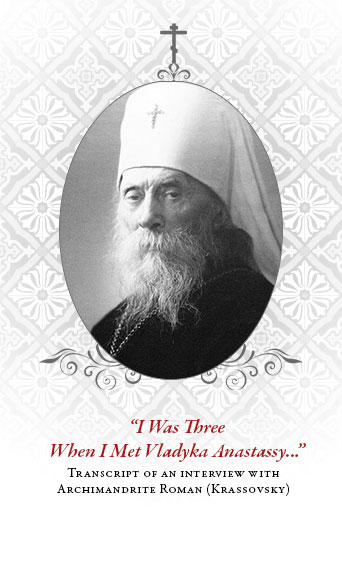“I Was Three When I Met Vladyka Anastassy…”

The Official Website of the Synod of Bishops of the Russian Orthodox Church Outside of Russia – 30/4/17
Transcript of an interview with Archimandrite Roman (Krassovsky), Chief of the Russian Ecclesiastical Mission in Jerusalem of the Russian Orthodox Church Outside of Russia with Alexander Mramornov of the program Veliky Sobor, in Jerusalem.
AM: How do you do, Fr. Roman?
Fr Roman: Christ is Risen!
AM: Fr Roman, you have served the Holy Church for a long time, and even saw some members of the Holy Council of Bishops of the Russian Orthodox Church in 1917-18, in particularly, Vladyka Anastassy. And your family remembers him well. Tell us about him.
Fr Roman: I was three when I met Vladyka Anastassy, these are my earliest recollections.
Vladyka Anastassy’s summer residence was at our parish in California. Every year, he would visit for 2-3 months. The Church of All Russian Saints had a parish house, it was considered a Synodal podvorie [representative branch], and that’s where I was baptized. My father, Vadim Vladimirovich Krassovsky, was the President of the Brotherhood of All Russian Saints. When Vladyka Anastassy was there, he had daily divine services, and my older brothers (I am the youngest) would serve as altar boys. We all went on to serve the Church, though we had no family history of the sort. But our father was active in society, and worked with scout camps and youth groups in China.
Vladyka Anastassy spent ten years in the Holy Land, he saved the Russian Mission in the 1920’s. He spoke English, he was a great diplomat, very refined. He was called “our holy relic” because he was such a faultless monastic. He was from the educated monastic line. When the first Patriarch was being elected, he received the sixth-highest number of votes, after Metropolitan Anthony (Khrapovitsky) and others, despite the fact that he was one of the youngest bishops.
He played an important role at that council, having been the chairman of the religious-educational conference, and drafted many documents.
He also wrote the rite of enthronement for the patriarch—that was his work.
At Holy Trinity Monastery in Jordanville, NY, where I lived for thirty years, we published an edition of В Свято-Троицком монастыре в Джорданвилле, где я тридцать лет жил, мы переиздали Sputnik Psalomshchika [The Psalm-readers Companion], which was a compendium of various liturugical compositions and ancient chants. When the first edition was published in 1959, the first copy was given to Vladyka Anastassy, who smiled and said “I read the corrected original,” while he served under Archbishop, then Metropolitan Arseny (Stadnitsky), whose spiritual son he was, one might say.
Vladyka Anastassy had a broad view of life, he was knowledgeable about Russian literature, he wrote a book about Pushkin. In fact, he would invite my father and others for evening Pushkin readings at his residence.
After the war, Vladyka Anastassy moved to New York and established the Church Abroad there. During his primacy of the Church Abroad, St John of Kronstadt was canonized in 1964. That was, obviously, a risky step to take—did we have the right to do so or not? But our Council of Bishops decreed that we did. At this council, Vladyka Anastassy tendered his resignation. He had been the second Primate of the Russian Church Abroad, after Metropolitan Anthony (Khrapovitsky).

[…] Source link […]